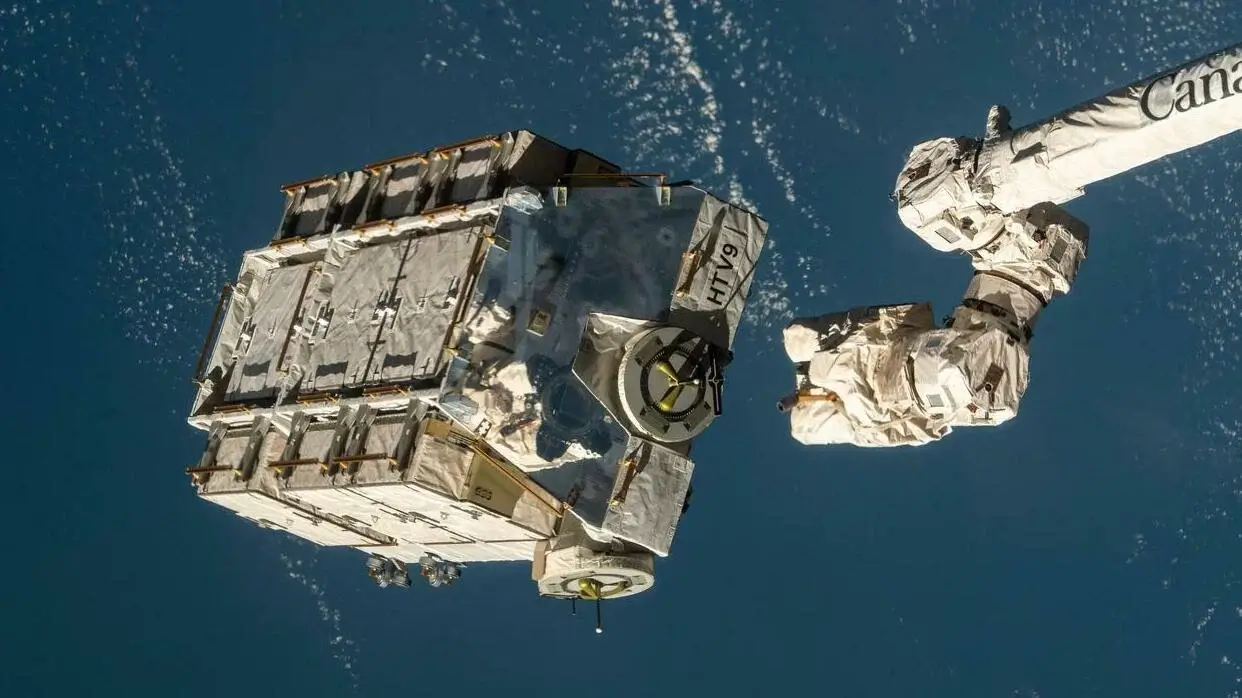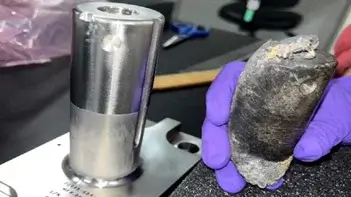Although the chance of space debris directly hitting humans or property on Earth is relatively low, the risk is increasing as more and more objects are thrown into orbit around the Earth. Scientists and space explorers are calling for coordinated international action to address the problem and prevent catastrophic scenarios in the future

Three years ago, astronauts dumped the largest item of trash ever thrown from the International Space Station. Now, some of it has seeped through a home in Naples, Florida.
On March 8, 2024, a heavy pallet loaded with used nickel-hydrogen batteries, dubbed Exposed Pallet 9 (EP9), entered the atmosphere, it began to fall over the Gulf of Mexico after being in space for three years. EP9 was launched to the International Space Station in 2020, but due to logistical complications, the astronauts had to throw it into space in 2021. In March 2024, part of it hit Alejandro Otero's home in Naples, Florida. The cylinder penetrated through the roof, ceiling and floor of the house. After a thorough examination, NASA confirmed that it was a support column from the support equipment used to mount the batteries on EP9.
Experts estimate that more than 130 fragments survived re-entry into the atmosphere and reached the surface of the Earth. Tobias Lips, CEO of Hyperschall Technologie Göttingen, noted that most of the fragments are cylinders made of a nickel-chromium alloy, which is used in aerospace applications.
Mark Sandel, whose group recently hosted a symposium on the threats posed by orbital debris, said: "I don't think it's an exaggeration to say that this is the biggest threat to humanity's use of outer space, that we're contaminating the orbits to such an extent that it might be difficult to use them at all."
He is very optimistic about the possibility that changes in law and policy can reduce or eliminate threats to orbit-based systems. "We are all so dependent on the space infrastructure in a variety of different ways," he said.

This event raises complex legal questions about responsibility and liability for damages caused by space objects. According to the UN Convention on International Liability for Damages Caused by Space Objects, the sending country is responsible for damages caused by space objects that it launched on Earth. In the case of EP9, the batteries belong to NASA, but they were attached to a pad launched by the Japanese Space Agency (JAXA), complicating the determination of legal responsibility.
Although the chance of space debris directly hitting humans or property on Earth is relatively low, the risk is increasing as more and more objects are thrown into orbit around the Earth. Scientists and space explorers are calling for coordinated international action to address the problem and prevent catastrophic scenarios in the future.
Experts warn that threats from orbital debris crashing into Earth's orbit are real and expected to grow, as more space systems are placed in low-Earth orbit. Many aerospace companies adopt a "design for disintegration" approach to their components, to ensure that if the parts re-enter the atmosphere, they will burn up at high altitude. However, some experts consider this a problematic practice at best.
One of the proposed approaches is the development of technologies to clean up space debris, such as dedicated satellites that can capture and remove stray objects from orbit. Another approach is to tighten the regulation and standards regarding throwing objects into space, and requiring companies and space agencies to plan in advance safe and controlled ways to decommission satellites and launchers after completing their missions.
Moriba J., an expert in tracking and managing space debris at the University of Texas at Austin, emphasizes that throwing debris into low Earth orbit in the hope that it will "naturally re-enter" the atmosphere "is not a responsible disposal method but an act of abandonment." Uncontrolled re-entry "is inherently irresponsible due to the potential risks it poses to life and property on Earth," says Jeh in an interview with NPR.
NASA announced that it will carry out a detailed investigation of the event of the waste disposal and its entry into the atmosphere to determine the reason for the survival of that component and to update analytical models accordingly.
Although space self-inflicted damage to homes on Earth is a relatively rare phenomenon, the Otero family's case highlights the growing need to address the problem of accumulated debris in space. Currently, the United States is tracking nearly 45,000 objects in orbit around Earth, including about 18,800 items of space debris, according to Space-Track.org, the public website of the US Space Command.
The International Space Station itself, which is the size of an American football field, is also in the process of de-orbiting planning as it approaches the end of its useful life after more than two decades of continuous human presence. NASA says the station will remain active until at least 2030, and it plans "a controlled re-entry into the atmosphere, aimed at a remote, uninhabited area of the ocean."
According to the experts, as humanity continues to explore and exploit space, it is essential that we act responsibly and sustainably to protect our fragile orbital environment. It will require collaboration between governments, industries and the academic community to find innovative solutions and implement safe and sustainable practices in our space activities.
More of the topic in Hayadan:

One response
We litter everything with selfishness and blindness, even space. It is better for humanity to cease to exist.